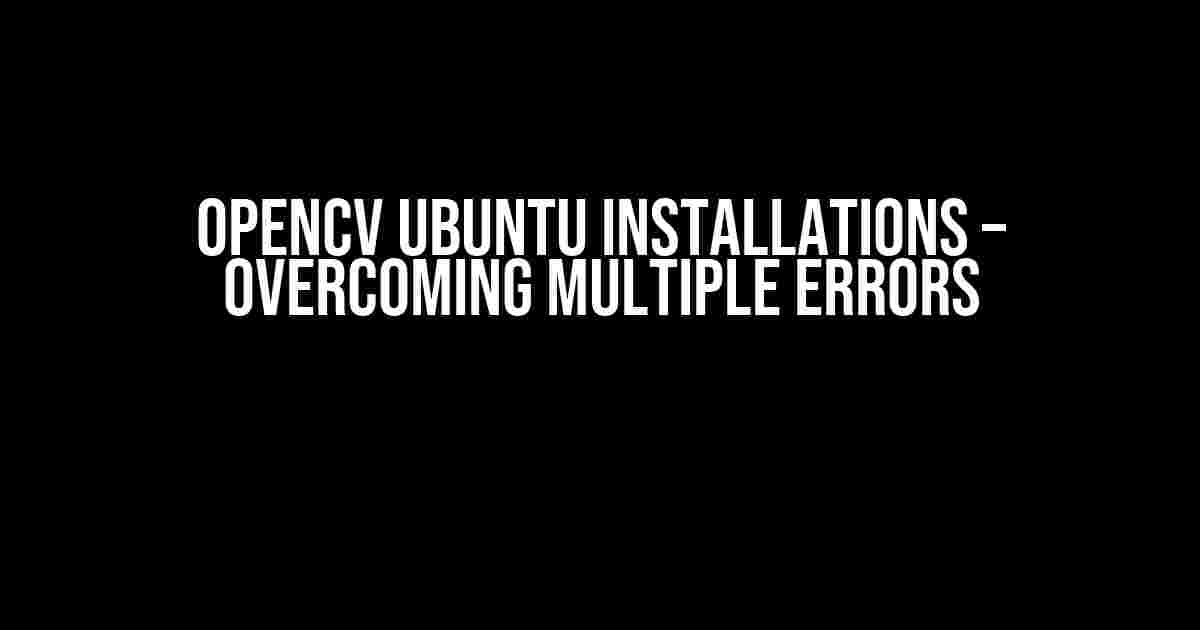Are you tired of wrestling with OpenCV installation on Ubuntu? Do errors and exceptions keep you up at night, leaving you wondering if you’ll ever get it right? Fear not, dear reader, for we’ve got you covered! In this comprehensive guide, we’ll walk you through the process of installing OpenCV on Ubuntu, tackling common errors and providing clear, step-by-step instructions to get you up and running in no time.
Prerequisites
Before we dive in, make sure you have the following:
- Ubuntu 18.04 or later (we’ll use 20.04 as an example)
- A stable internet connection
- A willingness to learn and troubleshoot (we’ll make it worth your while, promise!)
Method 1: Installing OpenCV via pip
The easiest way to install OpenCV is using pip, Python’s package manager. But, beware, this method can be finicky!
Step 1: Update pip
pip3 install --upgrade pipStep 2: Install OpenCV
pip3 install opencv-pythonIf you’re lucky, this will work like a charm. However, you might encounter issues like:
ImportError: libcblas.so.3: cannot open shared object file: No such file or directoryModuleNotFoundError: No module named 'cv2'
To overcome these errors, try the following:
Fix 1: Install required dependencies
sudo apt-get install libblas-dev liblapack-devFix 2: Reinstall OpenCV
pip3 uninstall opencv-python
pip3 install opencv-pythonMethod 2: Building OpenCV from Source
When pip fails, it’s time to get your hands dirty and build OpenCV from source!
Step 1: Install required dependencies
sudo apt-get install build-essential cmake git libgtk-3-dev lib_DC1394-22-dev libv4l-dev libxvidcore-dev libx264-devStep 2: Clone the OpenCV repository
git clone https://github.com/opencv/opencv.gitStep 3: Build and install OpenCV
cd opencv
mkdir build
cd build
cmake ..
cmake --build .
sudo make installThis process can take some time, so grab a cup of coffee (or two, or three…). When you’re done, you should have OpenCV installed.
Common Errors and Solutions
Encountered an error that’s not listed above? Fear not! Here are some additional solutions to common issues:
Error 1: CMake errors
If CMake throws errors during the build process, try updating your CMake version:
sudo apt-get install cmakeError 2: GCC compiler issues
If you’re using an older version of GCC, you might encounter compilation errors. Try updating your GCC version:
sudo apt-get install gcc-9 g++-9Error 3: pkg-config issues
If pkg-config is causing trouble, try reinstalling it:
sudo apt-get install --reinstall libpkg-configVerifying Your Installation
After installing OpenCV, let’s make sure it’s working as expected:
python3
import cv2
print(cv2.__version__)If everything went smoothly, you should see the OpenCV version printed. Congratulations! You’ve successfully installed OpenCV on Ubuntu!
Conclusion
Installing OpenCV on Ubuntu can be a daunting task, but with these instructions, you should be able to overcome common errors and get started with your computer vision projects. Remember to stay calm, patient, and persistent – troubleshooting is all part of the learning process!
| Tips and Tricks | Description |
|---|---|
| Use virtual environments | Isolate your OpenCV installation to avoid conflicts with other packages. |
| Check your Python version | Ensure you’re using a compatible Python version (3.6 or later) for OpenCV. |
| Consult the OpenCV documentation | Familiarize yourself with OpenCV’s official documentation for in-depth installation guides and troubleshooting tips. |
Happy coding, and don’t hesitate to reach out if you need further assistance!
Here is the HTML code for 5 Questions and Answers about “OpenCV ubuntu instalations – multiple errors” in a creative voice and tone:
Frequently Asked Question
Having trouble with OpenCV installation on Ubuntu? Don’t worry, we’ve got you covered!
Why am I getting a “dpkg: error processing package” error when installing OpenCV on Ubuntu?
This error usually occurs due to a corrupted package or an interrupted installation process. Try running the command ‘sudo apt-get update’ and then ‘sudo apt-get install -f’ to fix any broken dependencies. If the problem persists, try reinstalling OpenCV using ‘sudo apt-get install –reinstall libopencv-dev’.
How do I resolve the “cmake: command not found” error when installing OpenCV on Ubuntu?
This error occurs when the cmake package is not installed on your system. Simply run the command ‘sudo apt-get install cmake’ to install it, and then retry installing OpenCV. If you’re using a virtual environment, make sure to activate it before installing cmake.
Why am I getting a “fatal error: opencv.hpp: No such file or directory” error when compiling my OpenCV program on Ubuntu?
This error usually occurs when the OpenCV library is not properly installed or linked. Check if you have installed the necessary OpenCV packages (libopencv-dev, libopencv-contrib-dev) and if the OpenCV headers are correctly linked to your project. Also, make sure to include the correct path to the OpenCV headers in your compiler flags.
How do I fix the “ffmpeg: error while loading shared libraries” error when using OpenCV on Ubuntu?
This error occurs when the ffmpeg library is not installed or not properly linked. Run the command ‘sudo apt-get install ffmpeg’ to install it, and then retry running your OpenCV program. If the problem persists, try reinstalling OpenCV using ‘sudo apt-get install –reinstall libopencv-dev’.
Why am I getting a “undefined reference to `cv::imread`” error when compiling my OpenCV program on Ubuntu?
This error occurs when the OpenCV library is not properly linked to your project. Make sure to include the correct OpenCV libraries (e.g., -lopencv_core, -lopencv_highgui) in your compiler flags, and check if you have installed the necessary OpenCV packages (libopencv-dev, libopencv-contrib-dev). Also, ensure that your compiler is correctly configured to find the OpenCV headers and libraries.
Let me know if you need any modifications!
